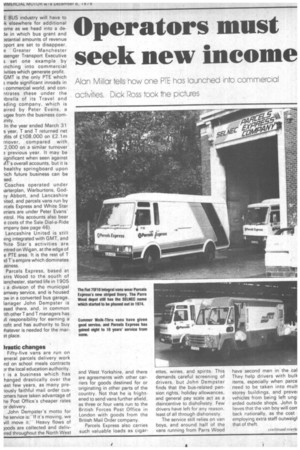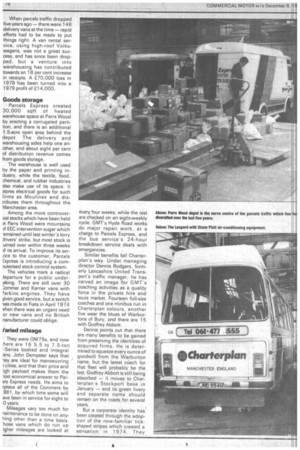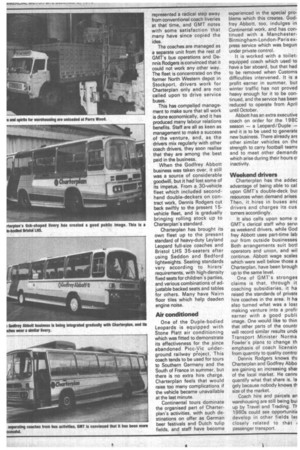Operators must seek new income
Page 79

Page 80

Page 81

If you've noticed an error in this article please click here to report it so we can fix it.
Alan Millar teils how one PIE has launchec into commercial activities, Dick Ross took e pictures
E BUS industry will have to ik elsewhere for additional ome as we head into a deJe in which bus grant and )stantial amounts of revenue 3port are set to disappear. e Greater Manchester 3senger Transport Executive s set one example by inching into commercial ivities which generate profit. GMT is the only PTE which 3 made significant inroads in commercial world, and conntrates these under the ibrella of its Travel and 3ding company, which is aired by Peter Evans, a ugee from the business corn
In the year ended March 31 s year, T and T returned net )fits of £108,000 on £2.1m mover, compared with :2,000 on a similar turnover a previous year. It may be iignificant when seen against OT's overall accounts, but it is healthy springboard upon lich future business can be 'sad.
Coaches operated under iarterplan, Warburtons, God)y Abbott, and Lancashire iited, and parcels vans run by ircels Express and White Star irriers are under Peter Evans' ,ntrol. His accounts also bear e costs of the Sale Dial-a-Ride )mpany (see page 46).
Lancashire United is still 3ing integrated with GMT, and fhite Star's activities are ntred on Wigan, at the edge of e PTE area. It is the rest of T T's empire which dominates iSiness.
Parcels Express, based at 3rrs Wood to the south of lanchester, started life in 1905 a division of the municipal amway service, and is housed 3W in a converted bus garage. lanager John Dempster is ased there, and, in common ith other T and T managers has ill responsibility for earning a rofit and has authority to buy rhatever is needed for the maret place.
h.astic changes Fifty-five vans are run on eneral parcels delivery work nd on school meals contracts 3r-the local education authority. t is a business which has hanged drastically over the iast few years, as many preiously faithful mail order cusomers have taken advantage of he Post Office's cheaper rates or delivery.
John Dempster's motto for he service is;'lf it's moving, we vill move it.'" Heavy flows of goods are collected and delivN-ed throughout the North West
and West Yorkshire, and there are agreements with other carriers for goods destined for or originating in other parts of the country. Not that he is frightened to send vans further afield, as three or four vans run to the British Forces Post Office in London with goods from the British Mail Order company.
Parcels Express also carries such valuable loads as cigar ettes, wines, and spirits. This demands careful screening of drivers, but John Dempster finds that the bus-related pension rights, holiday allowances, and general pay scale act as a disincentive to dishonesty. Few drivers have left for any reason, least of all through dishonesty.
The service still relies on van boys, and around half of the vans running from Parrs Wood
have second men in the .cal They help drivers with bulk items, especially when parce need to be taken into mull storey buildings, and prey& vehicles from being left ung, arded outside shops. John b lieves that the van boy will comm back nationally, as the cost employing extra staff outvveigl that of theft.
When parcels traffic dropped five years ago — there were 146 delivery vans at the time — rapid efforts had to be made to put things right. A van rental service, using high-roof Volkswagens, was not a great success, and has since been dropped, but a venture into warehousing has contributed towards an 18 per cent increase in receipts. A £70,000 loss in 1978 has been turned into a 1979 profit of £14,000.
Goods storage
Parcels Express created 30,000 sqft of heated warehouse space at Parrs Wood by erecting a corrugated partition, and there is an additional 1.5-acre open area behind the depot. The delivery and warehousing sides help one another, and about eight per cent of distribution revenue comes from goods storage.
The warehouse is well used by the paper and printing industry, white the textile, food, chemical, and rubber industries also make use of its space. It stores electrical goods for such firms as Moulinex and distributes them throughout the Manchester area.
Among the more controversial stocks which have been held 3f Parrs Wood were mountains yf EEC intervention sugar which -emained until last winter's lorry irivers' strike, but most stock is urned over within three weeks yf its arrival. To improve its serrice to the customer, Parcels Express is introducing a cornyuterised stock control system.
The vehicles mark a radical leparture for a public underaking. There are still over 30 L'ommer and Karrier vans with 'erkins engines. They have liven good service, but a switch vas made to Fiats in April 1974 vhen there was an urgent need or new vans and no British nanufacturer could oblige.
/aried mileage They were 0M75s, and now here are 16 5.5 to 7.5-ton .-Series bodied and integral ans. John Dempster says that ley are ideal for manoeuvring cities, and that their price and igh payload makes them the lost economical answer to Parels Express needs. He aims to ,place all of the Commers by 981, by which time some will ave been in service for eight to 0 years.
Mileages vary too much for naintenance to be done on any 'ling other than a time basis. hose vans which do run up igher mileages are looked at every four weeks, while the rest are checked on an eight-weekly cycle. GMT's Hyde Road works do major repair work, at a charge to Parcels Express, and the bus service's 24-hour breakdown service deals with emergencies.
Similar benefits fall Charterplan's way. Under managing director Dennis Rodgers, formerly Lancashire United Transport's traffic manager, he has carved an image for GMT's coaching activities as a quality force in the private hire and tours market. Fourteen full-size coaches and one minibus run in Charterplan colours, another five wear the blues of Warburtons of Bury, and there are 15 with Godfrey Abbott.
Dennis points out that there are many benefits to be gained from preserving the identities of acquired firms. He is determined to squeeze every ounce of goodwill from the Warburton name, but the latest coach for that fleet will probably be the last. Godfrey Abbott is still being absorbed — it moves to Charterplan's Stockport base in January — and its green livery and separate name should remain on the roads for several years.
But a corporate identity has been created through the adoption of the now-familiar tickshaped stripes which created a sensation in 1974. They represented a radical step away from conventional coach liveries at that time, and GMT notes with some satisfaction that many have since copied the idea.
The coaches are managed as a separate unit from the rest of GMT's bus operations and Dennis Rodgers is convinced that it could not work any other way. The fleet is concentrated on the former North Western depot in Stockport, drivers work for Charterplan only and are not called upon to drive service buses.
This has compellpd management to make sure that all work is done economically, and it has produced many labour relations benefits. Staff are all as keen as management to make a success of the venture, and, as the drivers mix regularly with other coach drivers, they soon realise that they are among the best paid in the business.
When the Godfrey Abbott business was taken over, it still was a source of considerable goodwill, but it had lost some of its impetus. From a 30-vehicle fleet which included secondhand double-deckers on contract work, Dennis Rodgers cut back swiftly to the present 15vehicle fleet, and is gradually bringing rolling stock up to Charterplan's standard.
Charterplan has brought its own fleet up to the present standard of heavy-duty Leyland Leopard full-size coaches and Bristol LHS 35-seaters after using Seddon and Bedford lightweights. Seating standards vary according to hirers' 'requirements, with high-density fixed seats for children's parties, and various combinations of adjustable backed seats and tables .for others. Many have Nairn floor tiles which help deaden engine noise.
Air conditioned
One of the Duple-bodied Leopards is equipped with Stone Platt air conditioning which was fitted to demonstrate its effectiveness for the since abandoned Picc-Vic underground railway pfoject. This coach tends to be used for tours to Southern Germany and the South of France in summer, but there is no extra hire charge. Charterplan feels that would raise too many complications if the vehicle became unavailable at the last minute.
Continental tours dominate the organised part of Charterplan's activities, with such destinations on offer as German beer festivals and Dutch tulip fields, and staff have become experienced in the special problems which this creates. Godfrey Abbott, too, indulges in Continental work, and has continued with a ManchesterBirmingham-London-Paris express service which was begun under private control.
It is worked with a toiletequipped coach which used to have a bar aboard, but that had to be removed when Customs difficulties intervened. It is a profit earner in summer, but winter traffic has not proved heavy enough for it to be continued, and the service has been reduced to operate from April until October.
Abbott has an extra executive coach on order for the 198C season — a Leopard/Duple — and it is to be used to generate new business. There already are other similar vehicles on the strength to carry football team; and to meet other demand; which arise during their hours o' inactivity.
Weekend drivers
Charterplan has the addec advantage of being able to cal upon GMT's double-deck bu: resources when demand arises Then, it. hires in buses an( drivers and charges its cus tomers accordingly.
It also calls upon some o GMT's clerical staff who servi as weekend drivers, while God frey Abbott uses part-time lab our from outside businesses Both arrangements suit botl operators and union, and wil continue. Abbott wage scales which were well below those a Charterplan, have been brough up to the same level.
One of GMT's stronges claims is that, through it coaching subsidiaries, it ha raised the standards of private hire coaches in the area. It ha also turned what was a lost making venture into a profii earner with a good publi image. One would like to thin that other parts of the countr will record similar results uncle Transport Minister Norma Fowler's plans to change th emphasis of coach licensin from quantity to quality control Dennis Rodgers knows thi. Charterplan and Godfrey Abbo are gaining an increasing shar of the local market. He cann( quantify what that share is, la gely because nobody knows th size of the market.
Coach hire and parcels an warehousing are still being bui up by Travel and Trading. Th 1980s could see opportunitie develop in other fields le; closely related to that passenger transport.
























































































































































